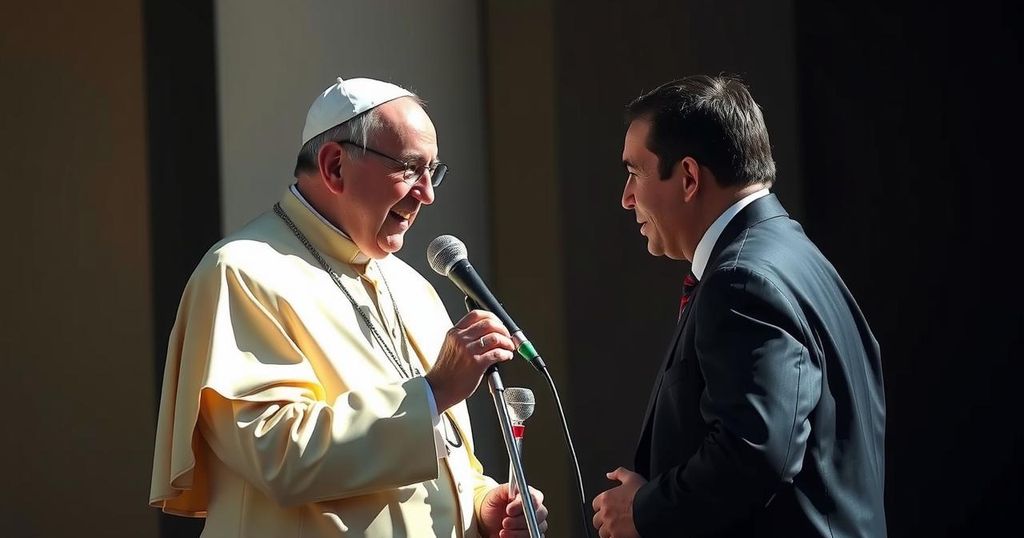Pope Francis Commemorates 1984 Treaty: A Model for Peaceful Conflict Resolution

Pope Francis commemorated the 1984 Treaty of Peace and Friendship between Chile and Argentina, highlighting its importance in resolving disputes through dialogue. He urged nations to emulate this model amidst ongoing global conflicts while condemning the hypocrisy of countries that advocate for peace yet invest in armaments. The Pope’s address called for a renewed commitment to fostering relationships built on trust and understanding, emphasizing the significance of peace in achieving social and environmental justice.
On November 29, 1984, a pivotal Treaty of Peace and Friendship was signed between Chile and Argentina, bringing an end to a longstanding territorial dispute over the Beagle Channel that had nearly escalated into war in 1978. This treaty, facilitated by the Holy See with Pope St. John Paul II as a central mediator, has significantly stabilized relations within South America. A ceremony celebrating this historic agreement was hosted at the Vatican, attended by Pope Francis and representatives from both nations.
Pope Francis took this opportunity to advocate for global peace and dialogue, highlighting the dedication of Chile and Argentina during the arduous negotiation process. He described their commitment as a model for resolving conflicts, especially pertinent in today’s troubled world. The Pope underscored the essential nature of peaceful dialogue, noting the profound contributions of both nations’ bishops, supported by their respective peoples, to a solution grounded in justice.
Focusing on the treaty’s core themes of peace and friendship, the Pope appealed for a renewed approach to conflict resolution, suggesting that these principles should guide international relations amid ongoing global crises. He pointed out that systemic issues like inequality, violence, and environmental degradation continue to instigate conflicts, emphasizing the importance of fostering relationships over material success.
In his remarks, Pope Francis reiterated the urgency of addressing the hypocrisy of nations that promote peace while simultaneously investing in weaponry, categorizing this contradiction as a failure of fraternity and peace. He concluded by invoking blessings for Argentina, Chile, and all nations committed to peace, emphasizing the enduring relevance of the 1984 treaty as a beacon for future negotiations.
This anniversary serves as a reminder of the power of constructive dialogue and the necessity of prioritizing peace in diplomatic efforts. The Pope’s address resonates in an era marked by persistent social and environmental challenges, urging humanity to embrace friendship with God and with one another as a pathway to enduring joy and peace.
The Treaty of Peace and Friendship, signed on November 29, 1984, resolved a significant border dispute between Chile and Argentina concerning the Beagle Channel. The tensions had been exacerbated in 1978, bringing both nations to the brink of military conflict. The Holy See, under the leadership of Pope St. John Paul II, played a crucial mediating role in facilitating negotiations, which ultimately led to the historic signing of the treaty. This agreement is regarded as a pivotal moment in stabilizing South American relations and is commemorated as an exemplary model for conflict resolution.
In conclusion, the commemoration of the 1984 Treaty of Peace and Friendship between Chile and Argentina underlines the importance of dialogue and negotiation in resolving disputes. Pope Francis’s reflections on the necessity of cultivating peace and friendship serve as a poignant reminder for the international community, highlighting the need to prioritize human relationships and address the underlying injustices that provoke conflict. His criticism of hypocrisy in peace-promoting nations underscores the ongoing challenges in achieving genuine peace. The message advocates for collective efforts to navigate and resolve contemporary social and environmental issues.
Original Source: www.vaticannews.va







